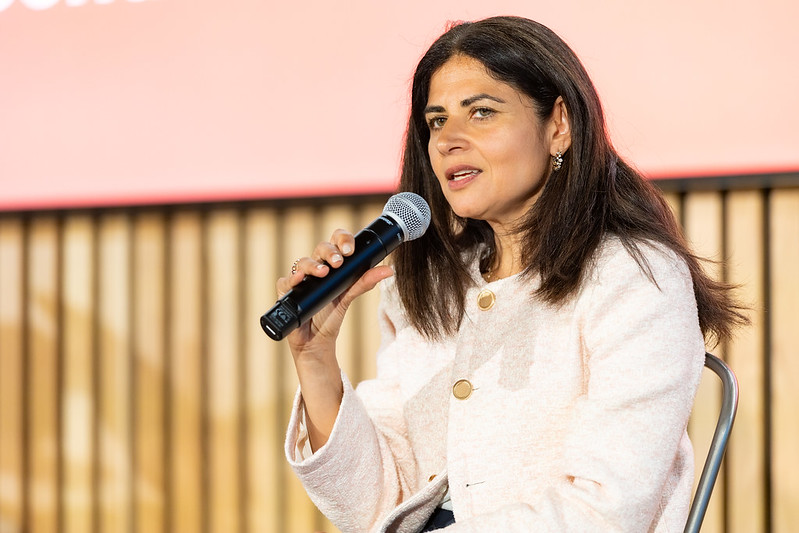Sonali de Rycker, general partner of Accel and one of the most influential capitalists in Europe, is bullish about the perspectives of the continent in artificial intelligence. But it is wary of a regulatory overcoming that the knee could have.
In an evening of Techcrunchi rigorously VC at the beginning of this week in London, De Rycker reflected on European place in the global breed of the AI, balancing optimism with realism. “We have all the pieces,” he told those gathered for the event. “We have entrepreneurs, we have ambition, we have schools, we have the capital and we have talent.” All that is missing, has supported, is the ability to “unleash” that potential on a scale.
The obstacle? The complex European regulatory panorama and, in part, its act of pioneering artificial intelligence but controversial.
De Rycker has recognized that the regulations play a role to play, especially in high -risk sectors such as health care and finance. However, he said he worries that the vast scope of the AI and potentially suffocating fines can discourage innovation when European startups need space to cause and grow.
“There is a real opportunity to make sure to go fast and face what we are capable of,” he said. “The problem is that we also find ourselves in front of winds contrary to the regulation.”
The AI law, which imposes rigid rules on the applications deemed “high risk”, from the credit score to medical humaging, has raised red flags between investors such as De Rycker. While the objectives of artificial ethical intelligence and consumer protection are praisable, it fears that the network can be thrown too wide, potentially discouraging the experimentation and entrepreneurship of the initial phase.
This urgency is amplified by moving geopolitics. With the support of the United States to European defense and the economic autonomy that descends under the current administration of Trump, De Rycker sees this moment as a decisive for the EU.
“Now that Europe is left to look after itself) in different ways,” he said, “we must be self -sufficient, we must be sovereign”.
This means unlocking the full potential of Europe. De Rycker indicates efforts such as the “28th regime”, a framework aimed at creating a single set of rules for businesses throughout the EU, essential to create a more unified and friendly region for startups. Currently, the mixture of laws at work, licenses and corporate structures in the countries creates friction and slows down progress.
“If we really were a region, the power you could unleash would be incredible,” he said. “We would not have these same conversations on Europe late in technology.”
According to De Rycker, Europe is slowly recovering, not only in innovation but in its embrace to risk and experimentation. Cities such as Zurich, Monaco, Paris and London are starting to generate their self-reinforcing ecosystems thanks to high-level academic institutions and a growing base of expert founders.
Accel, for his part, has invested over 70 cities throughout Europe and Israel, giving De Rycker a front row place to the fragmented but flourishing technological landscape of the continent. However, Tuesday evening, he noticed a clear contrast with the United States when it comes to adoption. “We see much more propensity for customers to experience the IA in the United States,” he said. “They are spending money for this type of speculative and initial companies. That flywheel continues.”
Accel’s strategy reflects this reality. Although the company has not supported any of the main Ai basic models such as Openi or Anthropic models, it has focused on the application level. “We feel very comfortable with the application level,” said De Rycker. “These fundamental models are in high intensity of capital and do not really seem companies supported by companies.”

Examples of promising bets include synthesia, a video generation platform used in corporate training and Speak, a language learning app that recently jumped to an evaluation of $ 1 billion. De Rycker (who dodged questions about the reported interviews of Accel with another big name in AI), sees them as the first examples of how IA can create completely new business behaviors and models.
“We are expanding the total markets that can be addressed to a rhythm that we have never seen,” he said. “It looks like the first days of the mobile phone. Doordash and Uber were not just mobilized websites. They were brand new paradigms.”
In the end, De Rycker sees this moment both as a challenge and a unique opportunity in the generation. If Europe is too inclined in regulation, it risks suffocating the innovation that could help him compete globally, not only in artificial intelligence, but throughout the technological spectrum.
“We are in a supercycle,” he said. “These cycles do not come often and we cannot afford to be on a leash.”
With the increasing geopolitical uncertainty and the United States who look at each other more and more inwards, Europe has no other choice than to bet on itself. If he can find the right balance, De Rycker believes he has everything he has to lead.
Asked by a participant what the EU founders can do to be more competitive with their US counterparts, he did not hesitate. “I think they are (competitive),” he said, quoting the companies he acted, including Supercell and Spotify. “These founders don’t seem different.”
You can capture the full conversation with de Rycker here:



